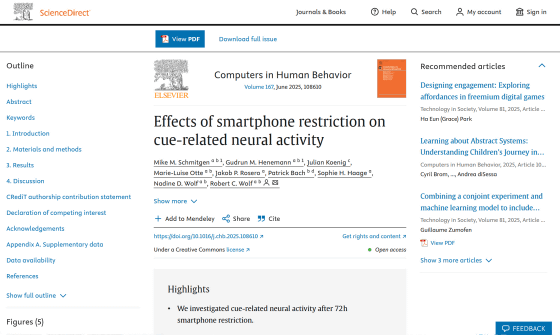Research shows that limiting smartphone use for just three days can change brain activity

Smartphones are an indispensable tool in modern people's lives, and are used widely from work contact to private entertainment, so it is unclear whether they are used because they are necessary or because they have become a habit. While some are concerned that 'excessive use of smartphones may lead to addiction,' a German research team conducted an experiment to examine how brain activity changes in people who limit their smartphone use.
Effects of smartphone restriction on cue-related neural activity - ScienceDirect

Taking a break from your smartphone changes your brain, study finds
https://www.psypost.org/taking-a-break-from-your-smartphone-changes-your-brain-study-finds/
Giving Up Your Phone For Just 3 Days Can Reshape Your Brain Activity : ScienceAlert
https://www.sciencealert.com/giving-up-your-phone-for-just-3-days-can-reshape-your-brain-activity
Previous studies have shown that people who use smartphones a lot show some differences in brain structure and function compared to those who do not. A new study focused on whether these differences are fixed or changeable by examining how limiting smartphone use affects brain responses.
'Smartphones have become an essential part of modern life, but there are growing concerns about their potential impact on mental health and brain function,' said study co-author Robert Wolf , Vice Chair of General Psychiatry at Heidelberg University Hospital. 'We were particularly interested in the effects of short-term smartphone restrictions on brain activity related to reward processing and attention. Given the growing discussion about digital well-being, we wanted to explore whether temporarily abstaining from smartphone use could lead to measurable changes in neural responses.'

The study enrolled 25 young people aged 18-30 who regularly use smartphones and were determined to have no internet gaming disorder or other significant mental health issues. They were then asked to complete questionnaires assessing their smartphone usage habits, craving levels and mood, and their brains were scanned with
After the first brain scan, participants were asked to significantly limit their smartphone use for the next 72 hours. This meant minimizing the use of smartphones and alternative devices and apps, and refraining from activities other than essential work, daily tasks, and communication with close contacts as much as possible. During this period, participants' smartphone use was not directly monitored, but they answered a short questionnaire on their device every day about their smartphone use, lifestyle, and health.
After 72 hours, participants again completed questionnaires about their smartphone craving levels and mood, and underwent fMRI brain scans.
During the two brain scans, participants were shown a variety of images. These included neutral ones, such as flowers and boats, as well as images designed to elicit a response to smartphones, such as smartphones with their screens off and with their screens on. By comparing brain activity when participants viewed these different types of images before and after the smartphone use restriction, the researchers could assess how the restriction affected brain activity.

The analysis confirmed that brain activity in the subjects' brains when they looked at images from smartphones changed before and after the restriction, regardless of whether the screen was on or off. Specifically, brain scans after the restriction on smartphone use showed increased activity in areas called the anterior cingulate cortex and the nucleus accumbens .
The anterior cingulate cortex and nucleus accumbens are important to the brain's reward system , often involved in cravings and impulsive behaviors, and increased activity in these brain regions suggests that participants experienced a brain boost when viewing smartphone-related images after the curtailed use period.
In addition, subjects who were shown images of smartphones with screens showed reduced brain activity in areas involved in attention and visual processing, such as the middle frontal gyrus and superior parietal lobule , after the restriction on smartphone use. This may suggest that the attention and stimulation brought by smartphone images decreased after the restriction on smartphone use.
Interestingly, the changes in brain activity were linked to brain systems that use dopamine and serotonin , neurotransmitters associated with reward and addiction. However, questionnaire results showed no significant changes in participants' mood or smartphone cravings before and after the 72-hour abstinence.

'Our study suggests that even brief periods away from smartphones can lead to changes in brain activity, particularly in areas related to reward and self-control,' Wolf told PsyPost. 'These findings indicate that excessive smartphone use may affect brain function in a similar way to other rewarding behaviors.'
The changes observed in this study are purely neurological, and long-term restrictions or interventions may be needed to produce significant psychological effects. The researchers hope to understand the long-term effects of smartphone use on brain activity in the future.
The research team emphasized that they had no intention of portraying smartphones as the 'bad guys' in this study. Wolf told PsyPost, 'Our study is not intended to paint smartphones in a negative light, but rather to understand their impact on the brain. Technology has many benefits, but it is important to recognize how our habits shape neural activity and well-being. A balanced and judicious use of digital devices may be the key to fostering a healthy relationship with technology in general and smartphones in particular.'
Related Posts:
in Science, Smartphone, Posted by log1h_ik







